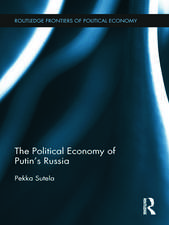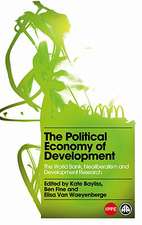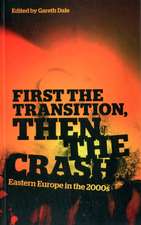Networks and Institutions in Europe's Emerging Markets: Cambridge Studies in Comparative Politics
Autor Roger Schoenmanen Limba Engleză Paperback – 16 dec 2015
| Toate formatele și edițiile | Preț | Express |
|---|---|---|
| Paperback (1) | 282.87 lei 6-8 săpt. | |
| Cambridge University Press – 16 dec 2015 | 282.87 lei 6-8 săpt. | |
| Hardback (1) | 466.38 lei 6-8 săpt. | |
| Cambridge University Press – 28 mai 2014 | 466.38 lei 6-8 săpt. |
Din seria Cambridge Studies in Comparative Politics
-
 Preț: 179.15 lei
Preț: 179.15 lei -
 Preț: 267.61 lei
Preț: 267.61 lei -
 Preț: 239.36 lei
Preț: 239.36 lei - 9%
 Preț: 594.67 lei
Preț: 594.67 lei -
 Preț: 160.82 lei
Preț: 160.82 lei -
 Preț: 269.58 lei
Preț: 269.58 lei -
 Preț: 264.74 lei
Preț: 264.74 lei -
 Preț: 177.28 lei
Preț: 177.28 lei -
 Preț: 225.70 lei
Preț: 225.70 lei -
 Preț: 164.94 lei
Preț: 164.94 lei -
 Preț: 236.42 lei
Preț: 236.42 lei -
 Preț: 185.64 lei
Preț: 185.64 lei -
 Preț: 233.13 lei
Preț: 233.13 lei -
 Preț: 206.71 lei
Preț: 206.71 lei -
 Preț: 231.82 lei
Preț: 231.82 lei -
 Preț: 206.52 lei
Preț: 206.52 lei -
 Preț: 201.24 lei
Preț: 201.24 lei -
 Preț: 358.37 lei
Preț: 358.37 lei -
 Preț: 203.42 lei
Preț: 203.42 lei -
 Preț: 232.45 lei
Preț: 232.45 lei -
 Preț: 257.82 lei
Preț: 257.82 lei -
 Preț: 191.12 lei
Preț: 191.12 lei -
 Preț: 158.77 lei
Preț: 158.77 lei -
 Preț: 199.05 lei
Preț: 199.05 lei - 11%
 Preț: 553.80 lei
Preț: 553.80 lei - 11%
 Preț: 695.06 lei
Preț: 695.06 lei -
 Preț: 288.80 lei
Preț: 288.80 lei -
 Preț: 262.06 lei
Preț: 262.06 lei - 11%
 Preț: 691.66 lei
Preț: 691.66 lei -
 Preț: 388.29 lei
Preț: 388.29 lei -
 Preț: 288.04 lei
Preț: 288.04 lei -
 Preț: 228.00 lei
Preț: 228.00 lei -
 Preț: 385.28 lei
Preț: 385.28 lei -
 Preț: 312.89 lei
Preț: 312.89 lei -
 Preț: 224.44 lei
Preț: 224.44 lei -
 Preț: 287.07 lei
Preț: 287.07 lei -
 Preț: 251.27 lei
Preț: 251.27 lei -
 Preț: 313.70 lei
Preț: 313.70 lei -
 Preț: 277.38 lei
Preț: 277.38 lei -
 Preț: 423.79 lei
Preț: 423.79 lei - 11%
 Preț: 552.94 lei
Preț: 552.94 lei - 11%
 Preț: 554.43 lei
Preț: 554.43 lei - 14%
 Preț: 783.26 lei
Preț: 783.26 lei
Preț: 282.87 lei
Nou
Puncte Express: 424
Preț estimativ în valută:
54.14€ • 56.37$ • 45.75£
54.14€ • 56.37$ • 45.75£
Carte tipărită la comandă
Livrare economică 11-25 martie
Preluare comenzi: 021 569.72.76
Specificații
ISBN-13: 9781316502860
ISBN-10: 1316502864
Pagini: 246
Ilustrații: 26 b/w illus. 15 tables
Dimensiuni: 152 x 230 x 15 mm
Greutate: 0.34 kg
Editura: Cambridge University Press
Colecția Cambridge University Press
Seria Cambridge Studies in Comparative Politics
Locul publicării:Cambridge, United Kingdom
ISBN-10: 1316502864
Pagini: 246
Ilustrații: 26 b/w illus. 15 tables
Dimensiuni: 152 x 230 x 15 mm
Greutate: 0.34 kg
Editura: Cambridge University Press
Colecția Cambridge University Press
Seria Cambridge Studies in Comparative Politics
Locul publicării:Cambridge, United Kingdom
Cuprins
Introduction; Part I. Foundations: 1. Approaches to institution building; Part II. The Role of Networks: 2. When broad networks increase cooperation; 3. Tracing ownership networks; Part III. The Role of Uncertainty: 4. When uncertainty increases cooperation; 5. Tracing elite career networks; Part IV. Bringing It Together: 6. Institutional development in new democracies; 7. Conclusion: political varieties of capitalism in emerging markets.
Recenzii
'Roger Schoenman's book transforms the well-known adage of the police investigator to 'follow the money' to 'follow the links' from one associate to the next. The irony of the so-called market reforms is that they provided the opportunity for entrepreneurs who realized the value of connections of old networks to create a new political and economic elite class. This reality was not, and is not, always pretty. Schoenman's analysis explains why some countries succeeded and others failed. It is a rich and analytical study that breaks away from the emphasis on macro-institutions to explain how countries are built bottom up.' Bruce Kogut, Sanford C. Bernstein Professor, Columbia University, New York
'Roger Schoenman's remarkable new book dives deeply into the fascinating (and often sordid) world of business and party linkages in emerging Europe. He explains why and when the mutual self-dealing of the oligarchs and the party elites can have broadly beneficial results, and he explains the dire consequences when one side or the other gets the upper hand for good.' Wade Jacoby, Mary Lou Fulton Professor of Political Science, Brigham Young University
'Roger Schoenman's remarkable new book dives deeply into the fascinating (and often sordid) world of business and party linkages in emerging Europe. He explains why and when the mutual self-dealing of the oligarchs and the party elites can have broadly beneficial results, and he explains the dire consequences when one side or the other gets the upper hand for good.' Wade Jacoby, Mary Lou Fulton Professor of Political Science, Brigham Young University
Notă biografică
Descriere
Examines the role of social networks in the efficient running of democratic market economies. This title is also available as Open Access.
















